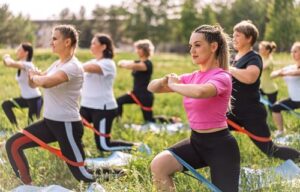Yoga has transcended its ancient roots and become a global phenomenon. Its myriad benefits for the mind, body, and soul are widely acknowledged. Whether you’re an experienced yogi or a beginner, the idea of becoming a certified yoga teacher may have crossed your mind. Choosing the right yoga teacher training course is crucial to your journey as an aspiring yoga instructor. This article aims to provide you with expert advice and tips to help you make an informed decision.
Why Is Choosing the Right Yoga Teacher Training Course Important?
Selecting the best yoga teacher training course is a pivotal decision that can significantly impact your career and personal growth as a yogi. Here are a few compelling reasons why it matters:
- Quality Education: High-quality training ensures you gain a comprehensive understanding of yoga philosophy, asana practice, and teaching methodologies. This knowledge is essential for teaching safe and effective classes.
- Yoga Alliance Certification: If your goal is to become a registered yoga teacher (RYT) with Yoga Alliance, choosing an accredited program is vital. It ensures that your training meets the industry standards.
- Career Opportunities: A reputable certification opens doors to teaching opportunities at yoga studios, fitness centers, or even the chance to run your own classes or workshops.
- Personal Growth: A great training program goes beyond just teaching yoga; it fosters personal growth and self-discovery.
- Connection with a Yoga Community: Joining a yoga teacher training course creates lasting connections with fellow trainees and instructors. These connections can be invaluable for networking and support throughout your journey.
Expert advice and tips to help you make the best decision
Now that you understand why choosing the right yoga teacher training course is important let’s delve into expert advice and tips to help you make the best decision.
1. Determine Your Yoga Style and Philosophy
Before selecting a training program, it’s crucial to identify your preferred yoga style and philosophy. There are various yoga styles, such as Hatha, Vinyasa, Ashtanga, Yin, and more. Each style offers a unique approach to yoga, so choose one that resonates with you.
Consider your personal values and what you’d like to incorporate into your teaching. Some programs have a strong focus on spirituality and mindfulness, while others emphasize physical fitness and alignment. Aligning your values with the training program’s philosophy will ensure a more enriching experience.
2. Verify Accreditation and Certification
One of the most important factors to consider is whether the training program is accredited by Yoga Alliance. Yoga Alliance is the largest and most recognized organization for yoga teacher certifications. An RYT (Registered Yoga Teacher) certification from Yoga Alliance can significantly boost your teaching prospects.
To verify a program’s accreditation, visit the Yoga Alliance website or contact the school directly. Ensure the program follows the 200 hour or 500 hour standard, as these are the most common certification levels.
3. Research the Instructors
Your yoga teacher trainers play a vital role in your learning experience. Take the time to research the instructors leading the training program. Look for their qualifications, experience, and teaching style. It’s beneficial to find instructors with whom you resonate and admire, as they will be your guides in this transformative journey.
4. Read Reviews and Testimonials
Before committing to a yoga teacher training program, read reviews and testimonials from past participants. Online forums, social media, and the school’s website can provide valuable insights into the program’s strengths and weaknesses. Pay attention to feedback regarding the curriculum, teaching quality, and overall experience.
5. Evaluate the Curriculum
Examine the curriculum in detail to ensure it covers all essential aspects of yoga teaching. The curriculum should include:
- Yoga philosophy and history
- Asana practice and alignment
- Teaching methodology
- Anatomy and physiology
- Meditation and pranayama
- The business of yoga (if applicable)
The program should also offer opportunities for practice teaching and feedback to prepare you for real-world teaching.
6. Consider the Location and Schedule
Whether you’re considering an in-person or online program, the location and schedule are critical. If you’re attending an in-person training, consider whether you prefer a local or destination program. Online options provide flexibility, but ensure the schedule aligns with your availability and time zone.
Read More: What Is Special About Rishikesh
7. Financial Considerations
Yoga teacher training can be a significant investment, so it’s important to consider the financial aspects. Compare the cost of the program with your budget, and inquire about any payment plans or scholarships the school may offer. Don’t forget to factor in additional expenses, such as textbooks, accommodations, and travel costs if attending an in-person training.
8. Visit the School (If Possible)
If you’re considering an in-person training, it’s advisable to visit the school before enrolling. This will give you a feel for the environment and an opportunity to meet with the instructors. It can also help you confirm that the school’s facilities meet your expectations.
9. Talk to Alumni
If possible, connect with alumni of the training program. Alumni can provide valuable insights and answer your questions about their experiences and how the program has benefited their teaching careers.
10. Trust Your Intuition
Finally, trust your intuition. If a program feels right and aligns with your goals and values, it’s likely a good fit for you. If something doesn’t sit well, explore other options.
Choosing the best yoga teacher training course is a significant step in your journey as a yogi. It’s a decision that can profoundly impact your career, personal growth, and well-being. By following the expert advice and tips outlined in this article, you can make an informed decision that aligns with your goals and values.
Remember that the ideal training program is one that not only equips you with the necessary knowledge and skills but also fosters personal growth, builds a strong community, and resonates with your inner yogi. Take your time to research, evaluate, and trust your intuition as you embark on this transformative journey. With the right training, you’ll be well on your way to becoming a confident and skilled yoga teacher.



